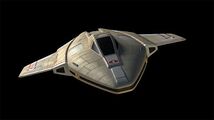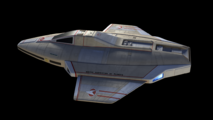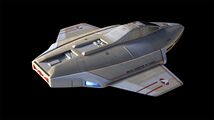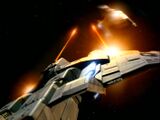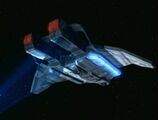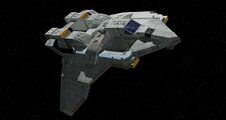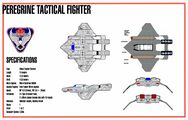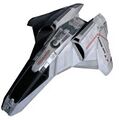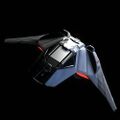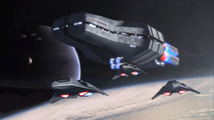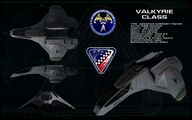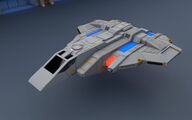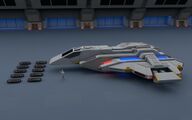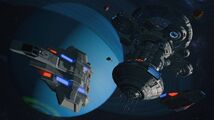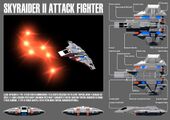Starfighters
More actions
Starfighters are relatively rare within the Federation during peacetime, largely held in storage at starbases and other similar facilities, but they are essentially shuttles with heavier armament, used to defend larger vessels and perform other tactical tasks. While some models have warp drive, they are generally only suited for use in the immediate range of their base or mothership. The most common uses for this type of auxiliary craft in peace time are pilot training and patrol missions.
Sparrow-class fighter
Template:Specifications The Sparrow class fighter is a small one-person craft that is fast and highly maneuverable, but lightly armed in its default configuration. It was developed in the 2350s to be posted to distant outposts that were more often the target of pirate raids rather than incursions by major threat forces, and so had a need for small armed vessels to perform patrol duties. They were also used across the Federation, including at Starfleet Academy, as pilot trainers, thanks to their simple controls and hardy systems.
These vessels are nearly as wide as they are long, with sweeping wings that contain the warp engines. The wings are useful to improve atmospheric flight characteristics which improves the Sparrow's utility as a colonial defense craft. The wings can also mount a single torpedo each with an underslung mounting point; they must use specially-modified torpedoes that have been built with propulsion devices rather than simply the warp sustainer engines found on normal torpedoes, and they only mount these for special missions. Otherwise they rely on a pair of Type-VIII phaser banks on either side of the cockpit. Though they lack the firepower of larger craft, they are unburdened by excess mass and thus can still maneuver to score critical hits on other fighters. In fleet situations, these craft are charged with hunting down other fighters and bombers, rather than assaulting capital ships, as that is a task that they are ill-suited for.
- Sparrow-class starfighters are mainly used as training vessels, because of their simple controls and time-tested design. Most Starfleet Academy graduates who have had even basic flight training will be familiar with this craft even if they're not a pilot themselves. They are well-known for being used in flight demonstrations by the Academy's elite training squadrons.
- It's not unusual to see Sparrow-class fighters assigned to frontier outposts and starbases, where they are more than capable of conducting patrol missions within star systems and inspecting craft for customs purposes.
- Sparrow-class fighters are also often found in colonial and planetary defense forces, because they are easy to operate. They're vastly outgunned by any serious threats, though.
Peregrine-class fighter
Template:Specifications Developed alongside the smaller Sparrow, the Peregrine has more serious armaments and requires a crew of two rather than one. They saw similar use to their smaller cousins on frontier postings, and many of them were appropriated by the Maquis in the middle of the 24th century. It wasn't until the Dominion War that these vessels were posted to front-line starships and sent into large battles. With the outbreak of war, the 1st Attack Squadron was thrown almost directly into combat and proved itself a highly effective weapon against the Jem'Hadar. Losses were painfully high, but their tactical successes were sufficient for Starfleet to authorize the construction and deployment of additional fighter squadrons across the front. They continued to prove a valuable tactical asset throughout the war. While the Peregrine is no longer the most modern or the most powerful vehicle in the Federation's fighter inventory, many of them remain in service - a testament to the fundamental soundness of their basic engineering and their well-established survivability in combat
These craft have two forward-facing Type-IX phaser cannons and microtorpedo launchers, which give them firepower that allows them to harass larger starships as well as to serve in a point-defense capacity. Like the Sparrow they can mount a limited number of full-sized torpedoes under their wings, giving them further utility as a bomber. They have a small aft compartment which can store cargo or supplies, or allow for crew rest, but these craft are not suited for missions longer than a few hours as they're only capable of Warp 3.
- Made famous during the Dominion War, the Peregrine-class is a heavier fighter than the older Sparrow, with seating for two and the addition of torpedoes alongside its phaser cannons. This makes it capable of engaging larger targets, and it remains a competent border patrol craft despite its age. This is a common fighter found on Federation starbases who do not need advanced Valkyrie-class fighters.
- This design is pretty old now, but it is reliable and versatile. Given its larger size than the Valkyrie, it has longer endurance, though it is slower.
- The wings on this craft fold up to allow it to be carried aboard nearly any starship, though generally the smaller Valkyrie is preferred for those kinds of deployments.
- With their microtorpedoes, the Valkyrie is a threat to larger starships, but they can also carry full-sized torpedoes under their wings to bring real firepower to bear. With that being said, they're still just as vulnerable as any other small vessel when alone and need to operate in squadrons for safety.
Valkyrie-class fighter
Template:Specifications Designed with lessons learned after the Dominion War, the Valkyrie class fighter is a much smaller vessel than the Peregrine class that retains its tactical systems with the maneuverability of the Sparrow class fighter, at the expense of mounting larger munitions. This makes it an ideal all-rounder space superiority fighter. As such, during peacetime, it tends to be the standard fighter deployed aboard Typhon and Akira class carriers. This craft is also posted to defend important installations such as Starfleet Headquarters and core sector starbases, with other units retained in storage against the threat of future war.
This vessel is small, but still requires a pilot and a weapons and systems officer, who sits behind the pilot in the cockpit. There is no additional space for cargo storage or passengers, and entry and egress are provided through the canopy. Armament consists of two type-IX phaser canons and microtorpedo launchers, which allow it to be a threat to larger spacecraft. It is especially suited to harassing large vessels that would not be able to evade it. In emergency situations, the cockpit can be jettisoned and serve as a very short term escape pod, though the crew would be reliant on flight suits to keep them alive.
- Developed during the Dominion War, the Valkyrie is a balance between the speed and agility of the Sparrow and the firepower of the Peregrine, which makes it a well-rounded starfighter suitable for nearly any mission. Their small size makes them perfect for deployment from starships, and they are now the preferred fighter in Starfleet service.
- This is a front-line design and is seen mainly on dedicated carriers and as a fighter assigned to very important starbases and outposts.
- This craft's main weakness is the limited amounts of fuel, consumables, and ordnance that it can carry; it is much more dependent on its mothership than the Peregrine, as its crew are dependent on flight suits for missions over 12 hours due to the limited life support capability. This can be enhanced with external support tanks, but in general these fighters can't get very far from their bases or carriers.
Apsara-class bomber
Template:Specifications Developed in tandem with the Valkyrie class fighter, the Apsara class bomber is a dedicated attack craft, suitable for both atmospheric and deep space operations. They have been built in relatively small numbers and are only typically deployed on dedicated carriers, but they give Starfleet tactical flexibility when an escort or other such starship might not be available.
The Apsara class has six torpedo tubes, two retractable launchers on the wing tips with a single torpedo each and four tubes on either side of the centerline that can hold up to two torpedoes each. Coupled with the same pulse phaser cannons mounted on the Valkyrie, this gives the Apsara tremendous forward firepower. Defensive coverage is provided by four Type-VIII phaser arrays mounted on the wings, as well as an aft-firing microtorpedo launcher, but these vessels are almost always escorted by fighters. The cockpit has two stations, one for the pilot and another for a tactical officer. Entry is provided by a hatch on the underside, as well as a docking port on the top.
- This is the most recent starfighter design in Starfleet service, and its the only dedicated bomber ever developed by the Federation. It carries six full-size torpedoes, as well as phaser arrays, phaser cannons, and microtorpedoes, and so it is a very capable attack platform. They are extremely rare.
- You won't see a craft like this except on a very important installation or a carrier starship. They're capable of raining down extreme levels of destruction, and so their production run was very limited.
- These craft aren't suited for engaging other small vessels, although they do have point-defense phasers to defend themselves, so they're dependent on other fighters to keep them safe during combat.

